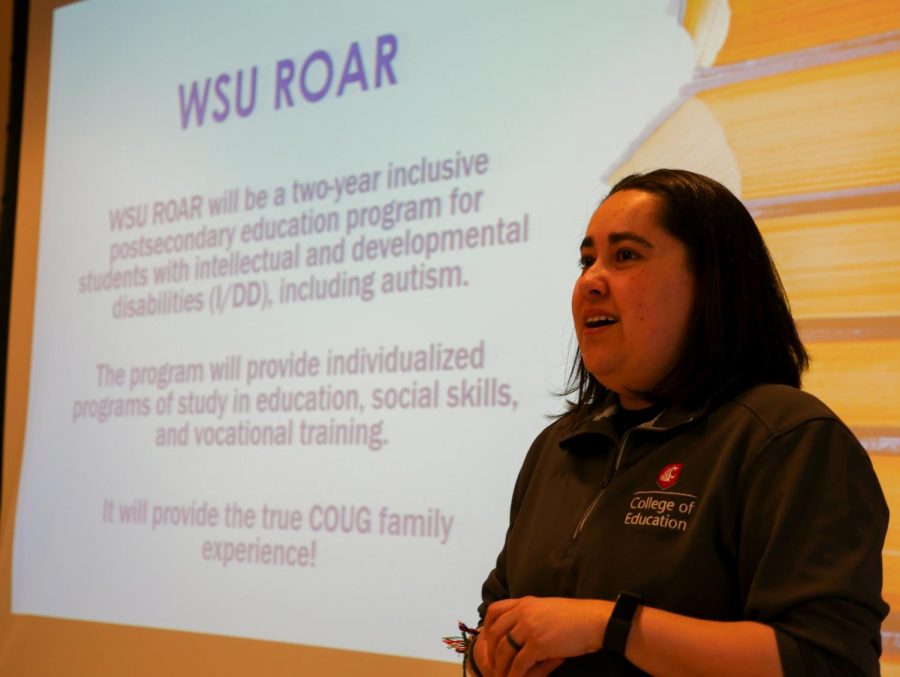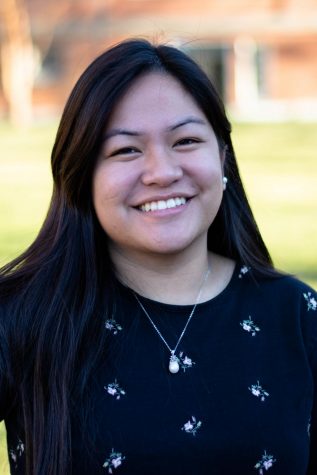Program aims to help students with disabilities
Two-year ROAR program to take on four students in the fall, more in coming years
BARRY BRIGGS | THE DAILY EVERGREEN
Brenda Barrio, assistant professor of special education, talks about the ROAR program, which will begin in the fall with four students.
April 16, 2018
An inclusive post-secondary education program for students with intellectual or developmental disabilities will launch in the fall semester and grow in the following years.
WSU Responsibility, Opportunity, Advocacy and Respect, or ROAR, is a two-year College of Education program for young adults ages 18-29 that will help them with their college experiences, from classwork to their social lives.
“One of the things that we really wanted to make sure that we had with this program is access, but also the opportunity for students to keep growing,” Brenda Barrio, assistant professor of special education, said. “It’s one thing to provide access, but another thing to actually provide support and the opportunities for them.”
ROAR will provide amenities such as auditing courses, same-aged peer support and on-campus housing.
Auditing courses, when available, are those that can be non-credited and focus on the student’s personal and career interests. Barrio said ROAR will work with faculty members individually to provide accommodations and modifications to alleviate concerns that may arise from faculty members and students.
“Faculty members don’t have to feel like they have to provide all this information,” Barrio said, “but also for our students to not feel the pressure of, ‘I need to make an A or I’m going to fail.’ ”
ROAR students are assisted with peer allies who are undergraduate and graduate student volunteers. Allies will be trained and given tasks such as accompanying ROAR students to class, introducing them to peers and participating in events and gatherings.
ROAR principal investigator Donald McMahon said peer allies will be providing a lot of support when it comes to accompanying ROAR students to class. Barrio said learning how to use public transportation is one of the things she hopes ROAR students will do.
“I imagine that our students will quickly start finding that level of independence,” McMahon said.
An attendee from ROAR’s information session commented during a presentation with Barrio that on-campus housing is one of the many services that distinguishes ROAR from other programs. ROAR students will live in a three- or four-bedroom apartment in Chinook Village with other students in the program. Assistive living advisers, much like resident advisers, will be available for questions and emergencies.
ROAR will be accepting four students for fall 2018, six for fall 2019 and 10 for fall 2020, Barrio said. Applications will be available on the program’s website and will close May 11.
The total approximate cost of the program, which includes university, program and housing fees, will be $22,983 per year. Approximate living costs such as food, books and supplies are about $3,500 per year, but are determined solely on the students’ needs. This brings the total cost to $26,393 per year, and there is no out-of-state tuition difference, Barrio said.
ROAR students are not eligible for financial aid yet, but they will be seeking accreditation through the U.S. Department of Education in their first year, Barrio said. Barrio said she and McMahon have been fundraising in the past year in order to build scholarships for students.
“We know that this is a big investment that some families may not be able to afford,” Barrio said.
Mack Armstrong, an attendee at ROAR’s information session, said the opportunities the program provides stuck out to him the most.
“I think that’s what everybody deserves,” Armstrong said. “What’s great about this program is that it’s creating that for kids that probably otherwise wouldn’t have that opportunity.”










